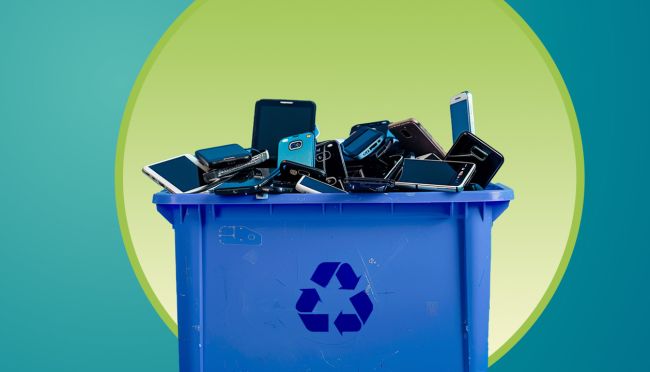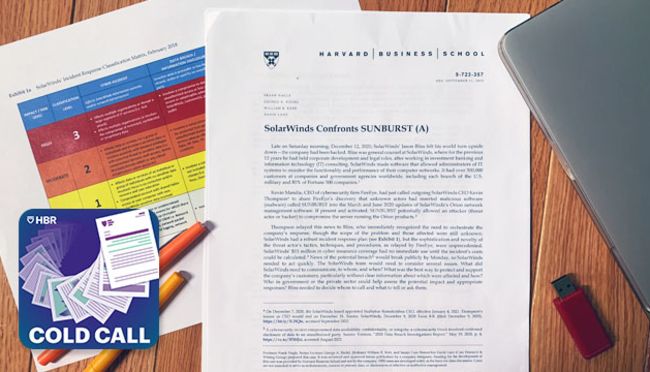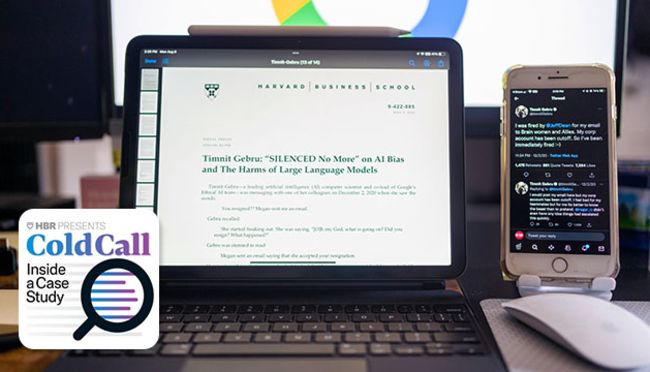Information Technology →
→

- 12 Mar 2024
- HBS Case
How Used Products Can Unlock New Markets: Lessons from Apple's Refurbished iPhones
The idea of reselling old smartphones might have seemed risky for a company known for high-end devices, but refurbished products have become a major profit stream for Apple and an environmental victory. George Serafeim examines Apple's circular model in a case study, and offers insights for other industries.

- 16 Jan 2024
- Cold Call Podcast
How SolarWinds Responded to the 2020 SUNBURST Cyberattack
In December of 2020, SolarWinds learned that they had fallen victim to hackers. Unknown actors had inserted malware called SUNBURST into a software update, potentially granting hackers access to thousands of its customers’ data, including government agencies across the globe and the US military. General Counsel Jason Bliss needed to orchestrate the company’s response without knowing how many of its 300,000 customers had been affected, or how severely. What’s more, the existing CEO was scheduled to step down and incoming CEO Sudhakar Ramakrishna had yet to come on board. Bliss needed to immediately communicate the company’s action plan with customers and the media. In this episode of Cold Call, Professor Frank Nagle discusses SolarWinds’ response to this supply chain attack in the case, “SolarWinds Confronts SUNBURST.”

- 09 Aug 2022
- Cold Call Podcast
A Lesson from Google: Can AI Bias be Monitored Internally?
Dr. Timnit Gebru was the co-lead of Google’s Ethical AI research team—until she raised concerns about bias in the company’s large language models and was forced out in 2020. Her departure sent shockwaves through the AI and tech community and raised fundamental questions about how companies safeguard against bias in their own AI. Should in-house ethics research continue to be led by researchers who best understand the technology, or must ethics and bias be monitored by more objective researchers who aren’t employed by companies? Professor Tsedal Neeley discusses how companies can approach the problem of AI bias in her case, “Timnit Gebru: 'SILENCED No More' on AI Bias and The Harms of Large Language Models.”

- 15 Oct 2020
- Research & Ideas
IT Job Wages Are No Longer 'Exceptional'
Wage growth in IT jobs has moderated following the dot-com boom, according to new research by Ruiqing Sam Cao and Shane Greenstein. Open for comment; 0 Comments.

- 09 Oct 2020
- Working Paper Summaries
Where the Cloud Rests: The Economic Geography of Data Centers
This study quantifies how data center managers make a trade-off between the setup and operational costs of running a facility and capturing local demand.

- 14 Sep 2020
- Research & Ideas
You're Right! You Are Working Longer and Attending More Meetings
A study of 3 million people confirms what many work-from-home employees already know: We're swamped. Research by Raffaella Sadun, Jeffrey Polzer, and colleagues. Open for comment; 0 Comments.

- 19 Jul 2020
- Working Paper Summaries
Open Source Software and Global Entrepreneurship
Does more activity in open source software development lead to increased entrepreneurial activity and, if so, how much, and in what direction? This study measures how participation on the GitHub open source platform affects the founding of new ventures globally.

- 29 Oct 2019
- Sharpening Your Skills
Robots in the Boardroom
Understanding cloud technology was the No. 1 imperative for executives this decade. Next up: How does artificial intelligence change business and management? Open for comment; 0 Comments.

- 22 Oct 2019
- Research & Ideas
Use Artificial Intelligence to Set Sales Targets That Motivate
Setting sales targets has always been an inexact science, with serious consequences if done poorly. Using AI-based advanced analytics might be the answer, argues Doug Chung. Open for comment; 0 Comments.

- 05 Sep 2019
- Sharpening Your Skills
Making the Right Technical Hire
CEOs are usually more comfortable making key hires on the business side of the house than the technology side. Here is what executives need to understand about technical hires, according to Julia Austin. Open for comment; 0 Comments.

- 10 Jun 2019
- Working Paper Summaries
Going Digital: Implications for Firm Value and Performance
More and more nontechnology companies are adopting digital technologies like AI, data analytics, and machine learning. This study of the economic performance of nontech firms adopting new digital technologies finds a persistent future increase in valuation. However, investors only slowly incorporate the value implications of digital activities into prices. Nontech companies with senior executives with tech talent improve performance more than those without.

- 30 Mar 2018
- What Do You Think?
What Should Mark Zuckerberg Do?
SUMMING UP: Facebook doesn't necessarily need a better data-privacy policy, James Heskett's readers suggest. Instead, Mark Zuckerberg needs a new business model. Open for comment; 0 Comments.

- 21 Mar 2018
- Research & Ideas
Why Artificial Intelligence Isn't a Sure Thing to Increase Productivity
As companies adopt artificial intelligence to increase efficiency, are their employees skilled enough to use those technologies effectively? Prithwiraj Choudhury looks to the US Patent and Trademark Office for a case study. Open for comment; 0 Comments.

- 05 Mar 2018
- Working Paper Summaries
Nowcasting Gentrification: Using Yelp Data to Quantify Neighborhood Change
This study finds that data from digital platforms (in this case, Yelp) can help forecast which neighborhoods are gentrifying and provide new ways to measure business landscape changes that accompany demographic changes.

- 01 Mar 2018
- What Do You Think?
Two Decades Later, is the 'New Economy' Finally Here?
SUMMING UP Have recent advances in technology such as artificial intelligence ushered in (finally) the "new economy?" Not so fast, answer James Heskett's readers. Open for comment; 0 Comments.

- 21 Aug 2017
- Lessons from the Classroom
Companies Love Big Data But Lack the Strategy To Use It Effectively
Big data is a critical competitive advantage for companies that know how to use it. Harvard Business School faculty share insights that they teach to executives. Open for comment; 0 Comments.

- 15 May 2017
- Sharpening Your Skills
The Promises and Limitations of Big Data
Recent stories chart the rise of big data, its impact on business, and how it affects our lives every day. Open for comment; 0 Comments.

- 20 Oct 2016
- Cold Call Podcast
The Spectacular Fall and Fix of HealthCare.gov
Professor Len Schlesinger describes his case study around the enormous challenges involved with building, launching, and ultimately fixing HealthCare.gov—one of the largest IT fiascos ever. Open for comment; 0 Comments.
- 02 Mar 2016
- What Do You Think?
Is Apple’s Real Privacy Challenge Technology Innovation Itself?
SUMMING UP: Apple's battle with the FBI over the iPhone contents of one of the San Bernardino shooters raises a question for James Heskett. Given the relentless pace of technology, can any company guarantee the privacy and security of its users? What do YOU think? Closed for comment; 0 Comments.

Amazon in Seattle: The Role of Business in Causing and Solving a Housing Crisis
In 2020, Amazon partnered with a nonprofit called Mary’s Place and used some of its own resources to build a shelter for women and families experiencing homelessness on its campus in Seattle. Yet critics argued that Amazon’s apparent charity was misplaced and that the company was actually making the problem worse. Paul Healy and Debora Spar explore the role business plays in addressing unhoused communities in the case “Hitting Home: Amazon and Mary’s Place.”